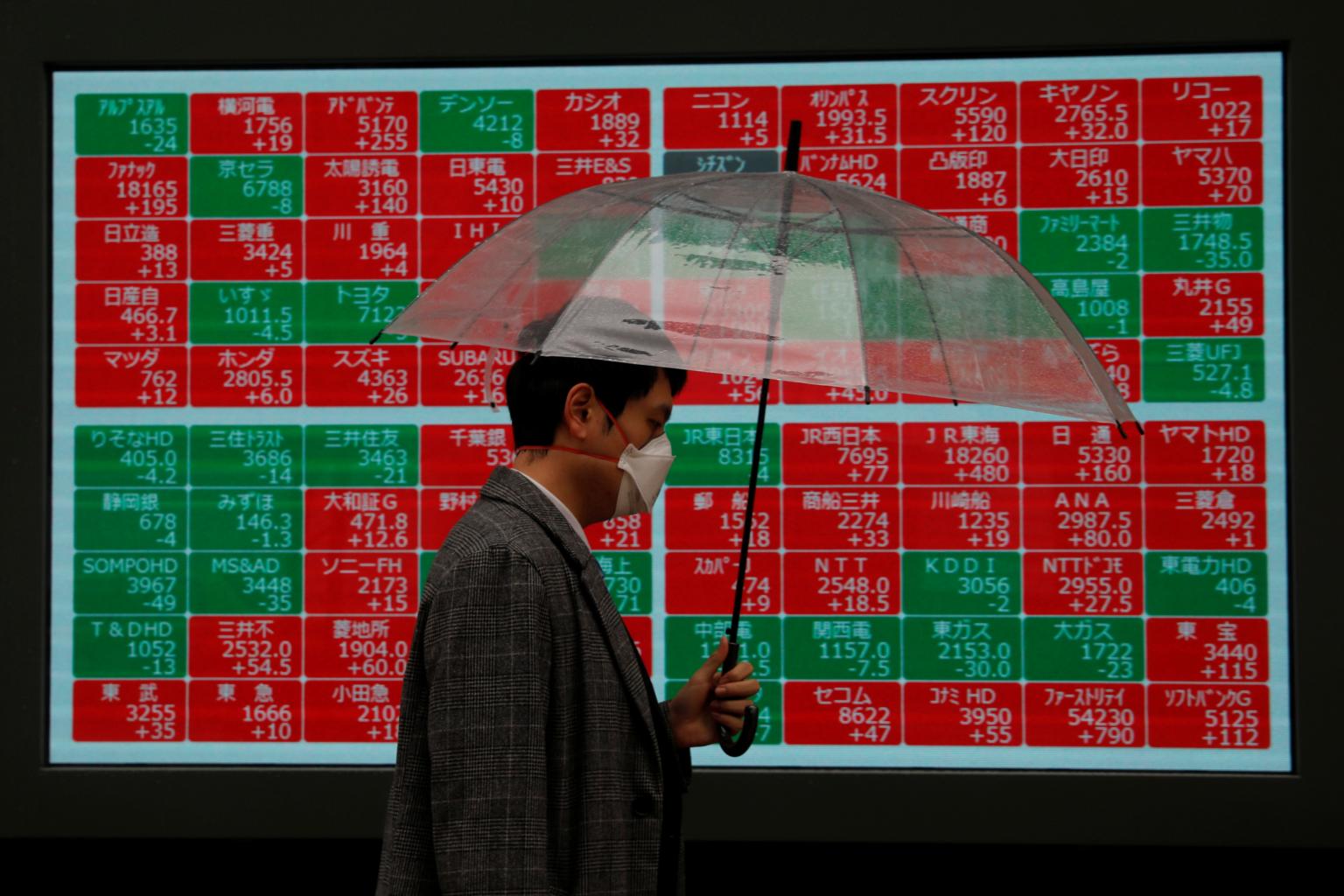Global shares mixed as investors mull Fed move, Biden comeback
Sign up now: Get ST's newsletters delivered to your inbox

A visitor wearing a protective face mask walks past a stock quotation board outside a brokerage in Tokyo, on March 2, 2020.
PHOTO: REUTERS
Follow topic:
LONDON (REUTERS) - Global stock markets were mixed as investors digested the Fed's move and a strong performance by Joe Biden in the Democratic Party primaries in the United States.
The surprise 50-basis-point cut, the Fed's first off-schedule move since 2008, came with comments highlighting both the scale of the challenge and the limits of monetary policy.
The Euro STOXX 600 gained 0.7 per cent. Markets in Frankfurt and London rose around 0.8 per cent and Paris 0.7 per cent. On Wall Street, S&P 500 futures climbed 1.5 per cent on Biden's showing, after falling overnight despite the Fed's rate cut.
Biden, a moderate considered less likely to raise taxes and impose new financial regulations, won primaries in at least eight states. That set up a one-on-one battle for the Democratic presidential nomination with democratic socialist Bernie Sanders.
The European moves built on gains for Asia-Pacific markets, where MSCI's broadest index of shares outside Japan rose 0.3 per cent.
Japan's Nikkei index closed flat with investors cautious as they eyed results from the race to become the Democratic challenger to US President Donald Trump.
Shanghai Composite Index rose 0.6 per cent whie South Korea's Kospi index gained 2 per cent on a US$9.8 billion government stimulus package to mitigate the coronavirus impact.
Hong Kong's Hang Seng Index fell 0.2 per cent, closing above the historical support level of 26,000 after fluctuating between slim gains and declines.
Australia's S&P/ASX 200 index lost 1.7 per cent to finish at 6,325.40, its lowest since June.
Singapore's Straits Times Index closed 5.47 points or 0.2 per cent higher at 3,025.03.
The benchmark 10-year US Treasuries yield, which falls when prices rise, held below 1 per cent - not far over the overnight low of 0.9060 per cent.
Euro zone bond yields also held near record lows, with Germany's benchmark 10-year Bund yield around -0.64 per cent, near six-month lows set on Monday.
Some saw the Fed's extraordinary move as a decision to move hard and early because it expected further economic damage from the spread of the coronavirus.
"They have signalled willingness to take further action, which is why we are seeing a further rally in bonds," said Tim Drayson, head of economics at Legal & General Investment management. "Some argue that monetary policy can't fight the supply shock - but it will support demand and confidence."
With safe-haven currencies in demand, the US dollar was near five-month lows versus the yen and fell to its lowest against the Swiss franc in almost two years. It was flat against a basket of six major currencies.
CUTS NOT ENOUGH?
The Fed's surprise move followed a shift in money market pricing late last week. Futures swung rapidly to anticipate such a cut at the Fed's March meeting.
Now, they imply another 50 basis points of easing by July, even though investors and the Fed itself raised doubts that easing will help deal with a public health crisis.
"If you're in China and you can direct liquidity exactly where you need to, and have rate cuts where you want them to be, monetary policy is very effective," said Sebastien Galy, senior macro strategist at Nordea Asset Management.
"In the West, in a democracy, monetary policy is less effective - you need to incentivise banks to do what is in to the benefit of the whole."
The coronavirus has killed more than 3,000 people, about 3.4 per cent of those infected - far above seasonal flu's fatality rate of under 1 per cent. It continues to spread beyond China - Italy reported a jump in deaths to 79 and South Korea reported more than 500 new cases on Wednesday.
"The question here is whether a conventional interest rate response is sufficient," said Sameer Goel, chief strategist, Asia macro, at Deutsche Bank in Singapore.

